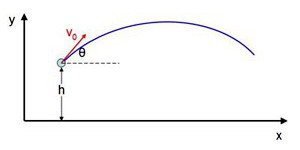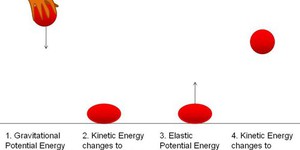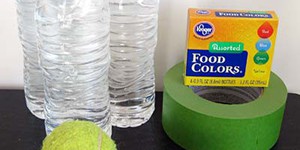Others Like “What Goes Up, Must Come Down: Conduct Galileo's Famous Falling Objects Experiment” (top 20 results)
|
Playing basketball can be hard work. Players not only constantly run around the court, but just dribbling the basketball takes a lot of effort, too. Why is that? It has to do with how the basketball bounces. When the ball hits the court, its bounce actually loses momentum by transferring some of its energy into a different form. This means that to keep the ball bouncing, players must continually put more energy into the ball. In this sports science project, you will determine how high a…
Read more
Many sports use a ball in some way or another. We throw them, dribble them, hit them, kick them, and they always bounce back! What makes a ball so bouncy? In this experiment you can investigate the effect of air pressure on ball bouncing.
Read more
In physics class, you have probably rolled your eyes at some point after being assigned a "projectile motion" homework problem where you use equations to predict how a ball will move through the air. This experiment will show you just how fun that problem can be by using a real catapult to launch a ball and videotaping it as it flies along its path. Then, you will analyze the video and compare it to what the equations predicted. If you have ever wondered if those equations in your physics…
Read more
You might think that plants and animals have little in common with batteries, springs, or slingshots, but they actually do have something in common. Both living and non-living things store and transfer energy from one form to another. In this physics science fair project, you'll investigate this energy storage and transfer, not in a plant or animal, but in bouncy balls. You'll find out if there are limits on how much energy can be stored and if there are losses when the energy is transferred.
Read more
Have you ever noticed that when you drop a basketball, its bounce does not reach the height you dropped it from? Why is that? When a basketball bounces, such as on a basketball court, its bounce actually loses momentum by transferring energy elsewhere. This means that to dribble the basketball, players must continually replace the transferred energy by pushing down on the ball. But what happens to the "lost" energy? As we know from physics, energy is not really lost, it just changes form. One…
Read more
Sometimes, simple toys can be quite complicated. Take the yo-yo. It's a fun toy and there is nothing simpler than a string wrapped between two connected disks. But there's a lot of physics that makes a yo-yo work. In this science fair project, learn more about how and why a yo-yo works. You will investigate the effect of string length on the yo-yo's "sleep" trick time. If people ask why you've got a yo-yo with you all the time, tell them that while it looks like you're just having fun, you're…
Read more
Do corked bats really hit the ball further? What about other materials? Here's a project to find out.
Read more
"Hey kids, step right up! Toss this ball and win a prize!" shouts the carny barker. Sounds easy enough—until you try it. Why are those "simple" games at the fairs, carnivals, and boardwalks so hard? Is it really lack of skill or coordination or do those concessionaires use some basic laws of science to help them set up the games in their favor? This science fair project can help you find out for yourself.
Read more
How does a parachute work? Do bigger parachutes work better than smaller parachutes? Find out in this science project if the size of the parachute matters.
Read more
Have you ever dropped something and wondered how fast it was moving while falling? If it was something fragile, like a cell phone, you might not have been thinking about this at the time — you may have been too busy trying to grab the phone! But you probably wanted to find out just how hard it hit the ground afterwards. We know that gravity forces an object to fall, but how does this affect how quickly something falls and how hard it hits the ground? For example, did the phone move faster…
Read more
|
Explore Our Science Videos
Explore the Wet Sand Effect – STEM activity
How can air pressure prevent leaks?
Making Shadow Puppets – STEM Activity













